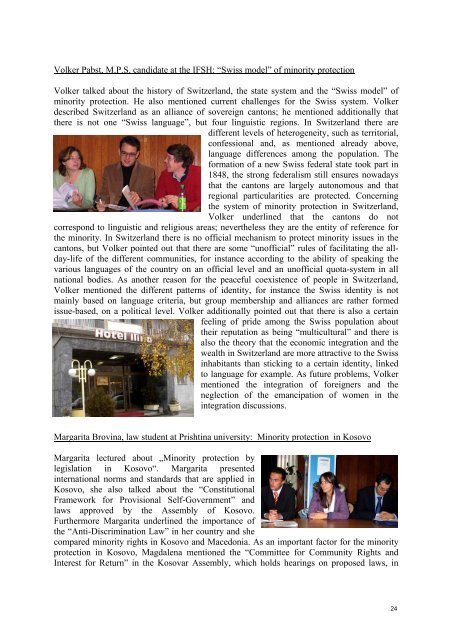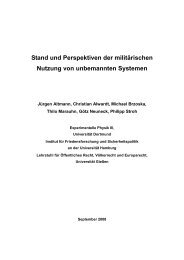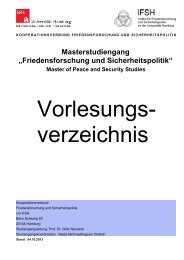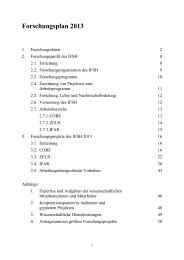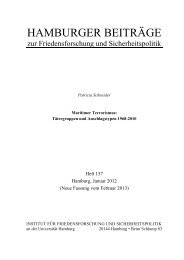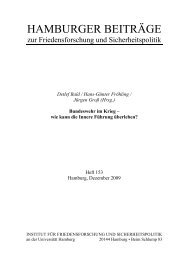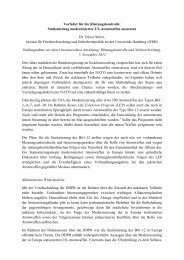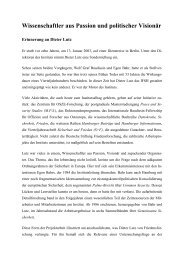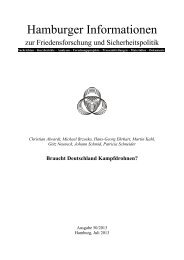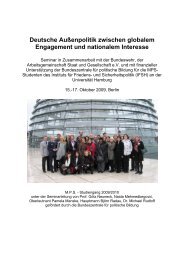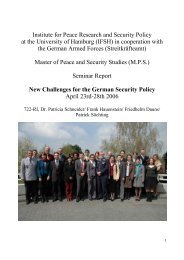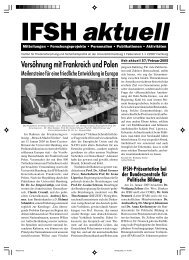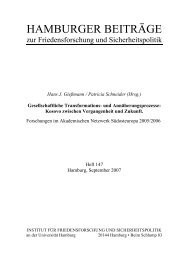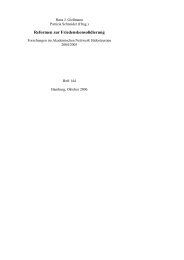Minority Rights Protection and Human Rights Policies in ... - IFSH
Minority Rights Protection and Human Rights Policies in ... - IFSH
Minority Rights Protection and Human Rights Policies in ... - IFSH
You also want an ePaper? Increase the reach of your titles
YUMPU automatically turns print PDFs into web optimized ePapers that Google loves.
Volker Pabst, M.P.S. c<strong>and</strong>idate at the <strong>IFSH</strong>: “Swiss model” of m<strong>in</strong>ority protection<br />
Volker talked about the history of Switzerl<strong>and</strong>, the state system <strong>and</strong> the “Swiss model” of<br />
m<strong>in</strong>ority protection. He also mentioned current challenges for the Swiss system. Volker<br />
described Switzerl<strong>and</strong> as an alliance of sovereign cantons; he mentioned additionally that<br />
there is not one “Swiss language”, but four l<strong>in</strong>guistic regions. In Switzerl<strong>and</strong> there are<br />
different levels of heterogeneity, such as territorial,<br />
confessional <strong>and</strong>, as mentioned already above,<br />
language differences among the population. The<br />
formation of a new Swiss federal state took part <strong>in</strong><br />
1848, the strong federalism still ensures nowadays<br />
that the cantons are largely autonomous <strong>and</strong> that<br />
regional particularities are protected. Concern<strong>in</strong>g<br />
the system of m<strong>in</strong>ority protection <strong>in</strong> Switzerl<strong>and</strong>,<br />
Volker underl<strong>in</strong>ed that the cantons do not<br />
correspond to l<strong>in</strong>guistic <strong>and</strong> religious areas; nevertheless they are the entity of reference for<br />
the m<strong>in</strong>ority. In Switzerl<strong>and</strong> there is no official mechanism to protect m<strong>in</strong>ority issues <strong>in</strong> the<br />
cantons, but Volker po<strong>in</strong>ted out that there are some “unofficial” rules of facilitat<strong>in</strong>g the allday-life<br />
of the different communities, for <strong>in</strong>stance accord<strong>in</strong>g to the ability of speak<strong>in</strong>g the<br />
various languages of the country on an official level <strong>and</strong> an unofficial quota-system <strong>in</strong> all<br />
national bodies. As another reason for the peaceful coexistence of people <strong>in</strong> Switzerl<strong>and</strong>,<br />
Volker mentioned the different patterns of identity, for <strong>in</strong>stance the Swiss identity is not<br />
ma<strong>in</strong>ly based on language criteria, but group membership <strong>and</strong> alliances are rather formed<br />
issue-based, on a political level. Volker additionally po<strong>in</strong>ted out that there is also a certa<strong>in</strong><br />
feel<strong>in</strong>g of pride among the Swiss population about<br />
their reputation as be<strong>in</strong>g “multicultural” <strong>and</strong> there is<br />
also the theory that the economic <strong>in</strong>tegration <strong>and</strong> the<br />
wealth <strong>in</strong> Switzerl<strong>and</strong> are more attractive to the Swiss<br />
<strong>in</strong>habitants than stick<strong>in</strong>g to a certa<strong>in</strong> identity, l<strong>in</strong>ked<br />
to language for example. As future problems, Volker<br />
mentioned the <strong>in</strong>tegration of foreigners <strong>and</strong> the<br />
neglection of the emancipation of women <strong>in</strong> the<br />
<strong>in</strong>tegration discussions.<br />
Margarita Brov<strong>in</strong>a, law student at Prisht<strong>in</strong>a university: <strong>M<strong>in</strong>ority</strong> protection <strong>in</strong> Kosovo<br />
Margarita lectured about „<strong>M<strong>in</strong>ority</strong> protection by<br />
legislation <strong>in</strong> Kosovo“. Margarita presented<br />
<strong>in</strong>ternational norms <strong>and</strong> st<strong>and</strong>ards that are applied <strong>in</strong><br />
Kosovo, she also talked about the “Constitutional<br />
Framework for Provisional Self-Government” <strong>and</strong><br />
laws approved by the Assembly of Kosovo.<br />
Furthermore Margarita underl<strong>in</strong>ed the importance of<br />
the “Anti-Discrim<strong>in</strong>ation Law” <strong>in</strong> her country <strong>and</strong> she<br />
compared m<strong>in</strong>ority rights <strong>in</strong> Kosovo <strong>and</strong> Macedonia. As an important factor for the m<strong>in</strong>ority<br />
protection <strong>in</strong> Kosovo, Magdalena mentioned the “Committee for Community <strong>Rights</strong> <strong>and</strong><br />
Interest for Return” <strong>in</strong> the Kosovar Assembly, which holds hear<strong>in</strong>gs on proposed laws, <strong>in</strong><br />
24


